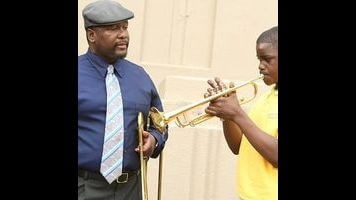Treme: "I'll Fly Away"

On Friday, Noel Murray and I posted a Crosstalk on television culture and criticism in which I expressed some ambivalence on writing about television week-to-week, with the downside being you lose perspective on a show’s overall scope when you cover it in pieces. I cited Treme as an example of a show that was giving me fits: “Every episode resonates with great music, a journalistic sense of place, and mostly magnetic characters, but overall, I have some nagging concerns about it being too repetitive and lacking in dramatic oomph. But when you’re writing about a show every week, and it keeps churning out hours as strong as Treme, it’s harder to identify where it isn’t working on the whole.”
And lo, last’s week episode, which Keith Phipps was gracious enough to cover for me, featured a major incident—Creighton’s suicide—that both defied a snap judgment and needed the next episode to sort out fully. You could react to it in several different ways: As a selfish, cowardly act by a man who’s abandoning a supportive and loving (saintly, really) wife and daughter. As a sad, symbolic acknowledgment that the city of New Orleans, which had been his passion and lifeblood, had past the point of no return. Or perhaps my favorite reading, from Mr. Phipps, who last week wrote that “it seems like the act of a man who's forgotten he’s not the protagonist of a novel.” (His Spaulding Gray comparison was also apt, I think.)
Whatever the case, it was a shocking turn of events, because I think we’d come to see Cray as a pugnacious fighter from the start, when he tossed the British journalist’s equipment into the water for asking a dumb question. I assumed him to be a David Simon surrogate, someone who pointedly (and sometimes angrily) articulated the ills of a city he loves. Yet when you consider Cray’s behavior over the course of the entire season—not a luxury I’ve had until now—you could see him occasionally bust recklessly through the guardrails. Throwing that reporter’s equipment around was a start, and those YouTube missives were similarly out of control, full of fuming righteousness that could also be seen as strident and unproductive. (As opposed to Toni’s work, which yields tangible results.) Add to that his failure to write—which reminded me Time Out and Tokyo Sonata, two movies about unemployed men who nonetheless persist in making their families think they’re working—and his genuine heartbreak over his city in ruins, and the suicide is at least plausible, if still disquieting.
The aftermath of Cray’s death is just one of the threads at play in the supersized finale, “I’ll Fly Away,” but like the rest of this fine, heartfelt episode, it was perfectly judged. We of course had reason to expect some great work by Melissa Leo as Toni—and she certainly doesn’t disappoint—but what struck me about the hour was the breadth and quiet dignity of Toni’s response. Without wallowing in this obviously great loss to Toni and her daughter, the episode hits a lot of subtle notes: grief, incomprehension, the difficulty of explaining this death (in a complete or incomplete way) with a young child, the heroic impulse to move on and keep fighting. But the moment that left me gobsmacked was Toni’s resolution not to give Cray the funeral he specified in his will. “He quit,” she says. “He fucking quit… Can’t dance for him when he quit.” And with that, we get all the perspective on Cray’s death that we need.
Aside from maybe Big Chief, the man who emerges as the truest, most stalwart champion of New Orleans is not Creighton, but Davis, who I think many have underrated and undervalued throughout the season. He could be pesky and annoying—and seemed to be cited most by detractors as the reason they were turned off by Treme early in the season—but his fortunes rose on his dogged optimism and rascally soul. His visit to Janette’s darkened apartment in the wake of her restaurant closing a couple weeks ago was one of the season’s sweetest moments, and his follow-through in “I’ll Fly Away” is as affirming as a David Simon series is ever likely to get. With Janette resolved to leave New Orleans and try again in New York, Davis asks for a day to convince her that there’s no better city than the one they’re in. And indeed, the day is filled with only-in-New-Orleans wonders—maybe it was Kim Dickens’ expression, but that nap by the sea was most persuasive—but I think Davis realizes that she’s leaving no matter what, and that’s part of what makes the gesture so selfless and special. He’s giving her something, and it’s only karmically proper that the universe should reward him by depositing Annie on his doorstep.
 Keep scrolling for more great stories.
Keep scrolling for more great stories.
